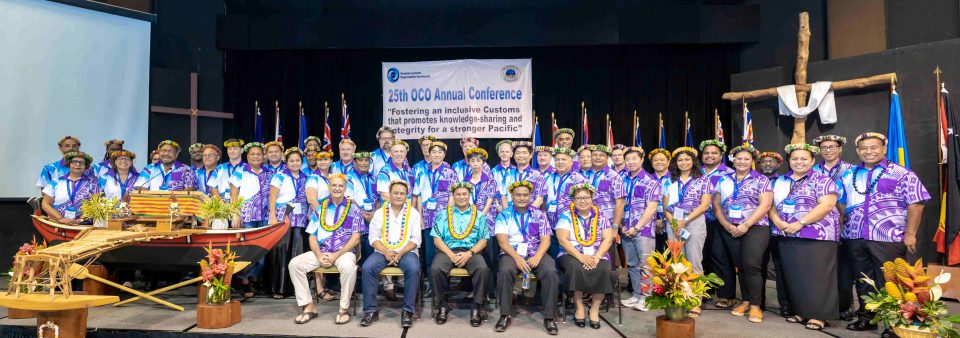Pacific Island countries boarders have become the trade zone for illicit and illegal activities, and something needs to be done to protect the boarders.
This was highlighted by the Federated States of Micronesia Vice President, Aren B Palik during the Oceania Customs Organization (OCO) 25th annual conference in Pohnpei this week.
Mr Palik has urged customs administrations to think outside the box and include people and communities in their efforts to protect the vast Pacific borders.
“We are aware that our islands are in the drug routes from North America, we are used as transition points and this is evident from the number of drugs washing ashore on some islands,” Palik said.
“Sadly, we are no longer only the drug routes, we are also now markets. So, what can we do with what we have? How do you make use of our greatest asset- our people- and include them in your work?” he added.
“I believe that if our people are aware of the dangers that lurk at the borders, they would be more than willing to be part of the work to protect their homes and of course their children. People need to know of what is not allowed into their countries- the barred imports, the counterfeits, the banned foods and one of the easiest ways of doing that is to have a good communication mechanism that works and that suits them,” he said.
Adding to that, World Custom Organization Secretary General Kunio Mikuriya urged Customs administrations to nurture their future generation and place the tech savvy young Customs officers at the heart of their modernization plans.
“Customs needs to establish and enhance systems for knowledge transfer to the younger generation,” Mikuriya said.
He added that Customs administrations around the world share a common and wide-ranging mission, which includes revenue collection, promoting economic competitiveness by facilitating trade and improving the business environment, as well as protecting society from illicit trade and transnational criminal activities.
The OCO chairperson Randy Sue also emphasized strongly on knowledge sharing as a key pillar in combating crimes along the border.
“The landscape of border security and trade facilitation has changed greatly in the last decade. An inclusive Customs that promotes knowledge sharing and integrity to build a stronger Pacific means working more closely with you all, building stronger relationships and creating tailor made solutions to meet our challenges,” Sue said.
“Into the future, we need to work harder. Our ability to defend our borders is tested daily. We need to move with time and on time. And we will rely on our development partners for their continued support,” he said.
OCO Head of Secretariat Nancy T Oraka said in order to monitor movement along the borders something has to be done.
“A futuristic looking OCO would be one where all members had interoperability capability, where we could see the movement of commodities in real time between countries. For example, there is some work towards this with the assistance of the Australian Border Force Session, who will provide progress on the development of the desktop exercises concept OCO members that would build information sharing and track the movement of commodities between member states,” Oraka said.
“This development is very critical for the Pacific. We are targets of transnational criminals for drug smuggling or money laundering. Sharing information with law enforcement agencies must also be effective and timely,” she said.
Ms Oraka added that, “the region relies on us as the first line of defense at the borders. It also relies heavily on us to facilitate economic growth at the borders. We have huge responsibilities that if not managed well would have adverse impacts on economies and people. The economic, social and physical health of the Pacific is in our hands. Arguably, we are the only profession that has that type of responsibility. And with pride, integrity and passion, we must carry out these roles as Customs Officer’s for a stronger Pacific.”
Due to COVID-19 pandemic, OCO has not been able to hold the heads of Customs annual meetings in the last three years and now resumed with the theme “Fostering an inclusive Customs that promotes knowledge-sharing and integrity for a stronger Pacific.”


